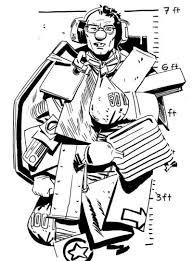
The Libertarian Futurist Society announced the 2019 winners of the Prometheus Awards for Best Novel and Hall of Fame (Best Classic Fiction) on July 6.
The winner of the Best Novel category is Causes of Separation by Travis Corcoran.
LFS members also voted to induct “Harrison Bergeron,” a dystopian 1961 short story by Kurt Vonnegut, Jr., into the Hall of Fame.
The citation says about the winning works:

In Causes of Separation, renegade lunar colonists fight for independence and a free economy against an Earth-based invasion that seeks to impose authoritarian rule and expropriate their wealth, while the colonists strive to prevail without relying on taxes or declaring emergency war powers. The panoramic narrative encompasses artificial intelligence, uplifted dogs, combat robots, sleeper cells and open-source software while depicting the complex struggle on the declining Earth and besieged Moon from many perspectives. The novel is a sequel to The Powers of the Earth, the 2018 Prometheus winner for Best Novel.

This is the first Prometheus Awards recognition for Kurt Vonnegut (1922-2007). In “Harrison Bergeron,” first published in 1961 in the Magazine of Fantasy and Science Fiction, Vonnegut blends a satirical and tragic tone in depicting a dystopian future in the United States where constitutional amendments and a Handicapper General mandate that no one can be stupider, uglier, weaker, slower (or better) than anyone else. Vonnegut dramatizes the destruction of people’s lives and talents and the obliteration of basic humanity via a denial of emotions and knowledge that leaves parents unable to mourn a son’s death. “Harrison Bergeron” exposes and mourns the chilling authoritarian consequences of radical egalitarianism taken to an inhuman and Orwellian extreme that denies individuality, diversity and the opportunity to excel.
LFS members John Christmas and Fred Moulton plan to present the Prometheus Awards in a ceremony at Dublin 2019 – An Irish Worldcon, to be held August 15-19 in Dublin, Ireland.
The other Best Novel finalists were Kingdom of the Wicked (including Order: Book One and Rules: Book Two), by Helen Dale (Ligature Pty Limited); State Tectonics, by Malka Older (TOR Books); The Fractal Man, by J. Neil Schulman (Steve Heller Publishing); and The Murderbot Diaries (All Systems Red, Artificial Condition, Rogue Protocol and Exit Strategy, by Martha Wells (TOR Books).
The other Hall of Fame finalists were “Sam Hall,” a novelette (1953) by Poul Anderson; “As Easy as A.B.C.,” a novelette (1912) by Rudyard Kipling; “Conquest by Default,” a novelette (1968) by Vernor Vinge; and The Universe Next Door, a novel (1979) by Robert Anton Wilson.
The Prometheus Award, sponsored by the Libertarian Futurist Society (LFS), is celebrating its 40th anniversary in 2019, having been first presented in 1979, making it one of the most enduring awards after the Nebula and Hugo awards, and one of the oldest fan-based awards currently in sf.
Presented annually since 1982 at the World Science Fiction Convention, the Prometheus Awards include a gold coin and plaque for the winners – with a one-ounce gold coin for Best Novel and a smaller gold coin for the Prometheus Hall of Fame (for Best Classic Fiction in all written and broadcast/on-screen media) and the occasional Prometheus Special awards.
In the words of the LFS:
The Prometheus Awards recognize outstanding works of science fiction and fantasy that dramatize the perennial conflict between Liberty and Power, champion cooperation over coercion, expose the abuses and excesses of government, critique or satirize authoritarian ideas, or uphold individual rights and freedoms as the mutually respectful foundation for peace, prosperity, progress, justice, tolerance, and civilization itself.
For a full list of past Prometheus Award winners in all categories, visit www.lfs.org.
Discover more from File 770
Subscribe to get the latest posts to your email.

Congratulations to Travis Corcoran.
As for “Harrison Bergeron”… well, I love Vonnegut, but I don’t think this story does what the Society says it does. Legislation that “corrects” people for being too tall, or too graceful, or having too pleasant a speaking voice is of course ridiculous – and deliberately so, it’s a satire – but is so far from what anyone has proposed in terms of advancing the cause of equality that I can’t even pretend that’s it’s exaggeration for the purposes of making a point about the supposed dangers of equality.
There are people who would deride a leader who seems intelligent and well-spoken as ‘professorial,’ who are ‘tired of experts telling us what to do,’ who would prefer a leader to be to sort of person ‘you can have a beer with.’ But they wouldn’t normally be described as “radical egalitarians”.
“Who knows better than I do what normal is?” asks one of the story’s characters – notably, one who hasn’t been burdened with any of the dystopia’s corrective measures, because she is already mediocre. Society – not egalitarian boogeymen – tries to stifle those who are feared to be better than “us.”
Vonnegut’s story does condemn a world which denies individuality, diversity and the opportunity to excel – but that is our world (and his, in 1961) without the positive measures promoted by radical egalitarians to counteract the stifling conformism of “no one better than me”.
Ken Finlayson: As for “Harrison Bergeron”… well, I love Vonnegut, but I don’t think this story does what the Society says it does.
I’ve always been amused at the vocal appreciation for this story by a group of people who seem to be utterly unaware that the oppressors described in it mirror themselves.
Pingback: AMAZING NEWS FROM FANDOM: 7/7/2019. ALSO RAH Birthday Edition - Amazing Stories
Maybe they thought it was a utopia story.
JJ:
I’m not seeing how you arrive at that. I don’t personally see HB as libertarian; but it seems to me that the people in it who play a role analogous to libertarians, and are satirized for it, are not the Handicapper General and her enforcers, but Harrison Bergeron and the unnamed dancer he chooses as his mate. Bergeron’s speech seems like a pointed satire on John Galt’s speech in Atlas Shrugged. And while it’s true that Bergeron is a would-be oppressor (he proclaims himself emperor of the world), his actual role in the story is that of a doomed victim; the actual oppressors are the enforcers of equality—and I don’t know of any libertarians who think that enforced equality is a good idea.
William H. Stoddard: I’m not seeing how you arrive at that.
Go back and read Ken Finlayson’s comment again. He’s right: Society – not egalitarian boogeymen – tries to stifle those who are feared to be better than “us”.
Liberal egalitarians, contrary to the story’s claims, don’t want to suppress excellence in anyone. They want to foster excellence in those who are currently being denied the opportunity to attain it through systemic inaccessibility to education and jobs. Egalitarians want to achieve equality by raising up those on the bottom of the pile — not by shoving everyone else to the bottom of the pile.
Go read the thousands of comments posted online by those who decry people who have higher educations as “liberal elitist intellectuals” — as if “liberal” and “intellectual” are dirty words. The people saying this are people who have no respect for knowledge and the benefits it confers, and who want everyone else to know just as little as they do. They are the ones who want to shove everyone to the bottom of the pile.
I’ll quote Ken Finlayson again: Vonnegut’s story does condemn a world which denies individuality, diversity and the opportunity to excel – but that is our world (and his, in 1961) without the positive measures promoted by radical egalitarians to counteract the stifling conformism of “no one better than me”.
JJ: On one hand, I don’t see what any of that has to do with libertarians. You seem to be equating “libertarian” with “conservative” or even “populist.” But libertarianism is a distinct viewpoint, and libertarians are a distinct population.
But also, I don’t see what that has to do with Vonnegut’s story. Even stipulating the “faith in opposite values” approach that you seem to favor, what does Vonnegut present as a conflict in his story? On one side, the Handicapper General and her troops; on the other side, Harrison Bergeron and his ballerina mate. If you’re positing that libertarians can be equated to the Handicapper General, are you then saying that liberal egalitarians correspond to a naive teenage boy who proclaims himself Emperor of the World, expressing a desire to rule everybody else? I don’t think the symbolism makes much sense.
In fact, I don’t think think interpreting “HB” in terms of specific political factions is very productive—even if you were to do it in terms of the political factions of 1961, rather than those of 2019. I think it’s about an opposition of abstract principles, which can’t necessarily be equated with any specific political faction in any era— intellectual satire and not mere roman à clef or allegory.
c4c
William H. Stoddard: On one hand, I don’t see what any of that has to do with libertarians… I don’t think think interpreting “HB” in terms of specific political factions is very productive
Neither Ken Finlayson nor I have mentioned libertarians, or any specific political factions other than liberal egalitarians. I suggest that you go back and actually read all of the comments on this thread again.
Pingback: Ganador premio Prometheus 2019 – Fantástica – Ficción